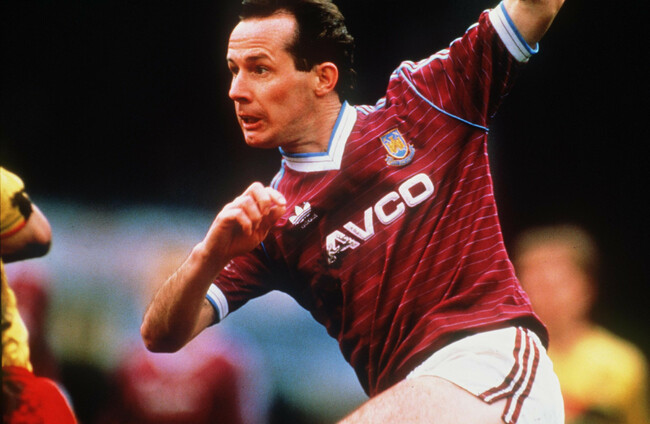ONE OF THE final scenes in the beautiful Liam Brady documentary which aired at the start of this week was the 34-year-old beating a defender on the run before rifling a shot into the top corner of the net.
He wheels away in celebration only to be mobbed by scores of fans who have invaded the pitch.
A caption explains that it was his final kick in professional football.
It came for West Ham, who play Tottenham Hotspur today, so absolutely no doubts at all who the Arsenal great will be supporting.
That fine goal came in the old Second Division, Brady’s 532nd game as a pro, almost three years after he returned to London from Italy in 1987.
On 10 March, the Evening Herald reported that Brady was set to join the Hammers the following day. Beneath the main story highlighting a 20-year-old Niall Quinn set to play for Arsenal against Liverpool, and former heavyweight champion George Foreman returning to the ring to face Steve Zouski after a decade in retirement, there were further details of why Brady’s time in Italy was coming to an end.
Having joined Juventus from Arsenal for £500,000 in 1980, the Dubliner won two Serie A titles before the arrival of Michel Platini forced him out due to the limits on foreign players.
Sampdoria, Inter Milan and Ascoli were his next three ports of call in the country, and it was from the latter that Brady negotiated his own release.
With a dispute over unpaid salary, and Italian Federation regulations forbidding a player leaving mid-season or before the end of their contract, Ascoli also pleaded with the authorities to allow Brady leave as they were in arrears and wished to break the contract.
There was the added confusion of Inter still being owed £100,000 from the previous transfer, but within a week the saga was complete.
West Ham boss John Lyall secured the 31-year-old’s services at a time when it was reported that Arsenal, managed by George Graham, passed up the opportunity for an emotional return.
Celtic were one club too slow off the mark to entice him, with Brady explaining how an early meeting with Lyall was all he required to make up his mind. “I had already committed myself to him,” he said, his wife Sarah and four-year-old daughter Ella remaining in Italy to begin with while he stayed with one of his three London-based brothers, Eamonn.
Another Eamon would be far less accommodating when the move was sealed.
Brady’s debut, with a young Paul Ince now a teammate, was a 2-0 defeat to a Norwich City side which had Steve Bruce at the centre of defence. The Irish Independent hailed the Ireland international’s individual display as “a masterful performance”, with 21,531 turning up to Upton Park, an increase of 5,000 from the week before.
“English football is a lot more physical and a lot quicker than when I left. I think there was a little more finesse in it seven years ago,” Brady told the paper.
“The Italians are technically superior but I have to say the English game has a lot going for it. Perhaps the ideal solution would be a combination of both.”
That revolution was not far away, the creation of the Premier League coming in 1992, by which point Brady would be manager of Celtic.
And yet, money, as always, was a gripe for some.
“It makes me sad when I see how greed has taken over the Irish soccer team,” a letter from John Doyle in Dublin 11 began in the Evening Herald during the week of Brady’s Ireland testimonial before the 1990 World Cup.
“With their names on television ads and all over the newspapers. The highest paid of them all is Jack Charlton, getting huge fees for making guest appearances. Why don’t the players donate some of their cash to the starving people of the Third World?”
These are debates and arguments that swirl incessantly regardless of era, but one particularly caustic column, and cartoon, summed up part of the feeling.
“Brady was never a good pro!” screams the headline, above a cartoon which depicts a haggard-looking Brady in an Ireland jersey. At his feet are three round bags and one being kicked in the air. It’s not hard to decipher what they represent, with Juventus, Sampdoria, Inter Milan and Ascoli written above the word lira, the country’s currency pre-euro.
The third line sets a tone. “He has earned one million pounds from soccer.”
There is, at least, added depth by the time the reader has made it to the end of the paragraph. “The truth of Brady’s public image is that it conforms rather more with the simplistic Hero/Villain caricature demanded by the sports pages of our newspapers than with reality.”
That is when you will come to the author of the column: Eamon Dunphy.
He describes West Ham’s decision as a gamble, deriding the move as “owing more to the desperate state of the English game than anything he has achieved in recent seasons.”
Dunphy’s acerbic critique of Brady continued, citing his decision to reject an earlier move to England’s north east for a £250,000 wage with newly-promoted Ascoli.
“For the 30-year-old millionaire who turned down Newcastle in favour of one last big pay-day had, at an age when he should still have been at his peak, neither the strength of character nor the legs to fulfil his part of the bargain.”
There are many more passages which, in the wake of the documentary this week and the relationship the pair had on RTÉ for the guts of three decades, almost feel incendiary, especially so when Dunphy insists Brady made “a modest contribution” to Juventus’ success and “was miscast in the role of playmaker, a responsibility he has never been physically or emotionally able to cope with…
“He has profited more than most sportsmen from the ignorance of those who form public opinion and the gullibility of wealthy men,” Dunphy added.
“Brady has always looked a good player… “Only an educated, professional eye could could understand the self indulgence that lay beneath the superficial touches of grandeur.”
The column finishes. “He never was a good pro.”
That move to West Ham was just the catalyst needed for Dunphy’s scorn, but as shown this week Brady’s class endures, as does the love and appreciation for his talent.


